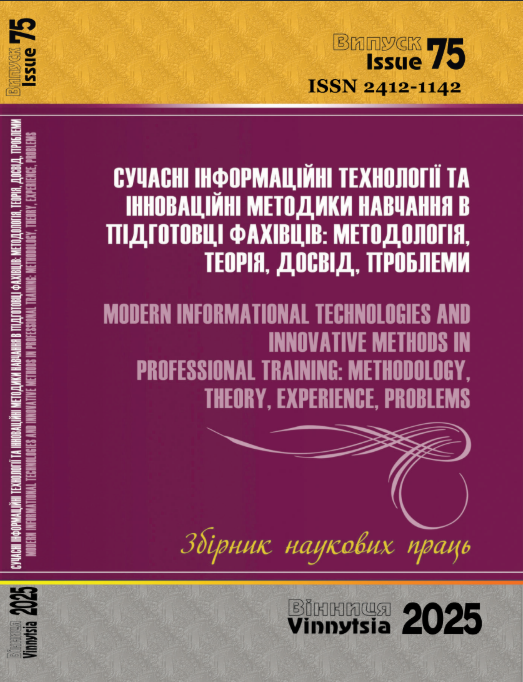EXPERIENCE IN THE USING OF AI IN THE PROFESSIONAL ACTIVITY OF A TEACHERS OF HIGHER MATHEMATICS
DOI:
https://doi.org/10.31652/2412-1142-2025-75-5-16Słowa kluczowe:
AI, Gemini, higher mathematics, educational materials.Abstrakt
This paper investigates the problem of discrepancies between the capabilities declared by AI model developers and the actual quality of the corresponding tasks performed by these models. AI developers, especially those working on large language models (such as Gemini), identify several opportunities for creating educational content: generating content for different purposes, adapting to different audiences, personalizing learning, rapid content creation, and continuous improvement. However, a significant problem arises from the lack of publicly available data on the error rate of AI in these tasks.
The issue is particularly critical in the context of creating educational content in higher mathematics. Errors in such materials can have critical consequences for students in higher education who use widely available AI models. This paper analyzes the possibilities of using Gemini AI to develop educational materials for higher mathematics courses. Examples of practical application of AI included its use to generate a solution to a given problem, generate task variants based on a template, and create multiple-choice test tasks. Most of the educational materials developed with the help of AI were related to testing students’ knowledge on the topic of the Theory of Functions of a Complex Variable. Real dialogues with AI are shown, which concern the correction of errors made by the model. The paper notes that all the comments made during the study were acknowledged and addressed by the AI model. Thus, at the current moment in time, the effective use of general-purpose AI models for generating educational content in higher mathematics can be carried out exclusively by users with a high level of mathematical training who can critically evaluate the results of the AI model. It is also shown that the lack of the ability to use formulas in Word Equation format when creating tasks for AI and generating its reports significantly reduces the effectiveness of AI in the professional activities of higher mathematics teachers.
Pobrania
Bibliografia
Official site of AI ChatGPT. URL: https://chat.openai.com/ .
Official site of AI Wolfram Alpha. URL: https://www.wolframalpha.com/
Official site of AI Google Bard. URL: https://bard.google.com/
Official site of AI Microsoft Bing Chat. URL: https://www.bing.com/chat
Official site of AI Mathpix. URL: https://mathpix.com/
Official site of AI. URL: https://gemini.google.com/
Yang, Z., Wu, J. G., & Xie, H. Taming Frankenstein’s monster: Ethical considerations relating to generative artificial intelligence in education. Asia Pacific Journal of Education. 2024. January. 1–14.
DOI: https://doi.org/10.1080/02188791.2023.2300137 DOI: https://doi.org/10.1080/02188791.2023.2300137
Jia, J., Wang, T., Zhang, Y., & Wang, G. The comparison of general tips for mathematical problem solving generated by generative AI with those generated by human teachers. Asia Pacific Journal of Education. 2024. 44(1), 8–28. https://doi.org/10.1080/02188791.2023.2286920 DOI: https://doi.org/10.1080/02188791.2023.2286920
Lewkowycz, A., Andreassen, A., Dohan, D., Dyer, E., Michalewski, H., Ramasesh, V., et al. Solving quantitative reasoning problems with language models. Adv. Neural Inf. Proces. Syst. 2022. 35, 3843–3857. DOI: 10.48550/arXiv.2206.14858
Wardat, Y., Tashtoush, M., Alali, R., and Jarrah, A. ChatGPT: a revolutionary tool for teaching and learning mathematics. Eurasia J. Math. Sci. Technol. Educ. 2023. 19, 1–18. DOI: 10.29333/ejmste/13272 DOI: https://doi.org/10.29333/ejmste/13272
Liu, J., Wang, C., Liu, Z., Gao, M., Xu, Y., Chen, J., & Cheng, Y. A bibliometric analysis of generative AI in education: current status and development. Asia Pacific Journal of Education. 2024. 44(1), 156–175.
DOI: https://doi.org/10.1080/02188791.2024.2305170 DOI: https://doi.org/10.1080/02188791.2024.2305170
Schorcht S., Buchholtz N., Baumanns L. Prompt the problem – investigating the mathematics educational quality of AI-supported problem solving by comparing prompt techniques. Frontiers in Education. 2024.
Vol. 9. 15 p. DOI: 10.3389/feduc.2024.1386075 DOI: https://doi.org/10.3389/feduc.2024.1386075
Krantz S. G. A Guide to Complex Variables. The Mathematical Association of America, 2008. DOI: https://doi.org/10.5948/UPO9780883859148
Remmert R. Theory of Complex Functions. Springer, 1989.
Tuluchenko G. Y. Maplet-application for the development of didactic materials on the topic “Linear inhomogeneous differential equations of the second order with constant coefficients and right-hand side of special type”. Part 1, Modern Information Technologies and Innovative Teaching Methods in the Training of Specialists: Methodology, Theory, Experience, Problems 74 (2024) 113-122. DOI: https://doi.org/10.31652/2412-1142-2024-73-113-124
DOI: 0.31652/2412-1142-2024-73-113-124
Official site of program «Digital Skills for Education with Google». URL: https://google.brandlive.com/Develop-Your-Digital-Skills-for-Education-with-Google/uk/home
Pobrania
Opublikowane
Numer
Dział
Licencja
Prawa autorskie (c) 2025 Галина Тулученко, Інна Вигоднер

Utwór dostępny jest na licencji Creative Commons Uznanie autorstwa 4.0 Międzynarodowe.





